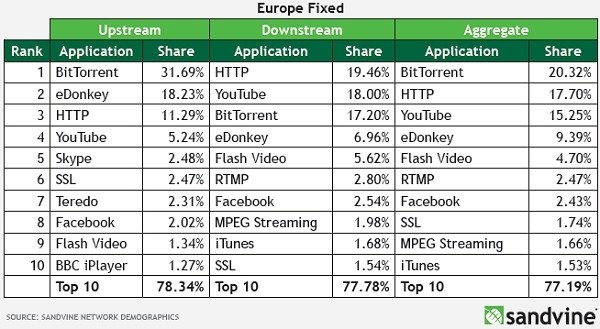<p>
<p>Essentially, what I am saying is this is not rocket science. The fact that Sandvine and other companies have to formulate these reports, and that websites like TorrentFreak report them so that big media can be enlightened as to what factors exactly decrease piracy is actually a bad sign. It tells us that they are not really looking for the better way, but the most profitable. Which is, ironically, the former; but they can't see it. I truly hope this wakes them up.</p>
</p>
<p>Sandvine doesn't HAVE to build these reports, they probably sell them to the media companies just like any other industry analyst service. Buying a report to learn about customer habits (or demographics, culture etc.) is perfectly normal, not a 'bad sign'.</p>
I wasn't talking about they having to, as in, having to as an effort to help big media understand how piracy truly affects their business, I meant having to, as in, stating the obvious; as in the businesses they are selling this to willing to buy such information and having, consequently, websites like TorrentFreak report them with the underlying hope that these very businesses can ultimately understand the "better way" of truly decreasing piracy around the content they produce.
I'll write simpler so that you understand my point:
My first sentence stated that "this is not rocket science." The fundamental objective of this report is so that big media firms that use this data can better assess the digital landscape regarding the affect of increased/decreased usage of P2P sharing. I get that. But do you seriously think they use this data for the simple purpose of analyzing demographic usage patterns? They use this data to analyze the trend that this article talked about, and how to properly maximize on that trend.
The point made by the article is that, at the end of the day, it shows that Bitorrent traffic has declined mostly thanks to easier-to-access, consumer-friendly, legal avenues. My point being is that they have to buy usage patterns from firms like Sandvine in order for them to maximize revenue by analyzing changes in the always-connected-consumer construct. Hell, what else do you think they use this data for? To <I>not</I> analyze usage patterns to properly strategize a business plan? Do you think they look at the demographics data and no business decision whatsoever takes place afterwards? Don't be naive.
<p>You think it's easy to deliver digital content for a decent price that keeps all the copyright holders happy? </p>
It's quite easy. Look at Steam. Then look at Ultra-Violet. Similar underlying principles, poorly executed by businesses who still think content blocking and "exclusivity" will win over the new generation of content consumers.
<p>You notice how it said in the article that torrent traffic hasn't decreased, but legal distribution has increased? That means the content is getting to more people and the media companies are therefore making more money off it. Why do you say they 'don't have a clue?'</p>
Legal distribution has indeed increased but <I>not</I> from the companies who are being precisely targeted in both the article and in my argument. Only the companies who are doing it right are seeing more and more consumers. Companies like who? Netlfix. Services such as WhatsApp. Music streaming services such as Pandora. What do these companies/services have in common? They all let you consume content wherever you are, with little to minimal restriction. Even with paid services such as Netlifx, the thought of watching whatever you want, as much as you want, wherever you want, and whenever you want, for one monthly fee, is better than being locked in by the companies you DON'T see mentioned in the report, who all base their business practices in these almighty words: the value of exclusivity.
What I meant was a bad sign is them needing this data to determine how to properly maximize revenue in the digital content market, when all you really need to worry about, like I said with Gabe's statement, is: provide your customers with a superior value. That's it. There's no need to startegize, to look at usage patterns to see that customers are willing to pay for content that's DRM-free and easy to access, which is a notion that apparently negatively affects these big media businesss who think pirates pirate wheter such content is easily available to them or not. This report effectively points to that, and my hope is that they don't ever need this report to get to that conclusion, but to get there because it is, quite truthfully, the better way.
The purpose of this report is evident, but the need of big businesses for these reports is a bad sign. Not because they could use this data as useful market analysis for properly launching/strategizing/remodeling current products and/or other forms of digital content (as I'm sure that accounts to about 30% of the reason), but because the real, bigger goal here is how this report's services, patterns and percentages are nothing but variables they place in a contrived equation whose ultimate goal is how to maximize profits under their "our way or the highway" model.
